ROUNDUP: JAPANESE CINEMA SPLASH AT 30TH TIFF

TIFF Programming Director Yoshi Yatabe once again selected a wide variety of independent films for the Japanese Cinema Splash section, from relatively big-budget titles with familiar faces to low-budget creative works — and for the first time ever, one documentary. In all, nine films vied for this year’s Best Picture Prize, with its ¥1 million payoff.
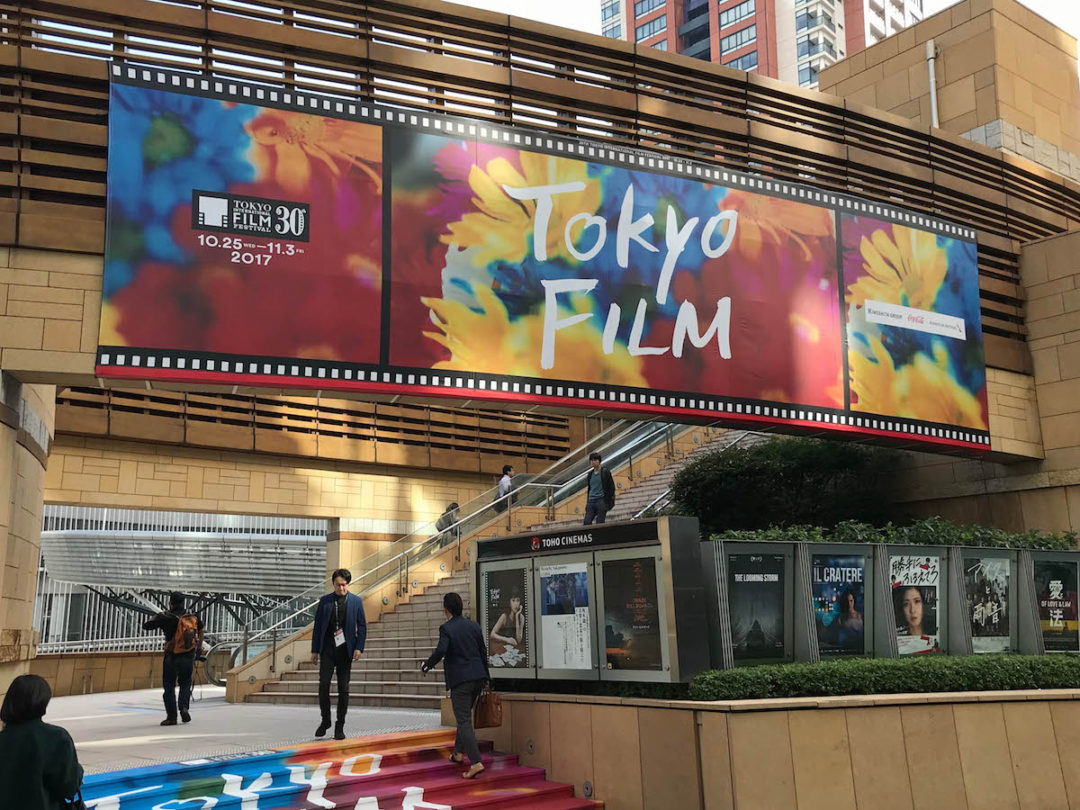
For fervent Japanese cinema followers, there are three sections at the Tokyo International Film Festival of special note: the Animation Focus (this year, Keiichi Hara was the animated filmmaker treated to a career retrospective); Japan Now, which screens some of the year’s most notable releases and this year featured the Four Muses of Japanese Cinema; and Japanese Cinema Splash, the only section of the three that is competitive.
Of the Splash lineup, Waiting for the Moon and Goodbye, Grandpa! were the two titles that could be considered most conventional. Michio Koshikawa, the helmer of Areno: The Wilderness (which appeared in Splash in 2015) and Life and Death on the Shore (2017, which was featured in this year's Japan Now section), tackled another R-rated romance between two lonely recluses in his Waiting for the Moon. Yukihiro Morigaki’s Goodbye, Grandpa! is a family dramedy about a brouhaha at the funeral for a grandfather. Both features should please fans of the directors, but the lack of surprises made them rather too orthodox.
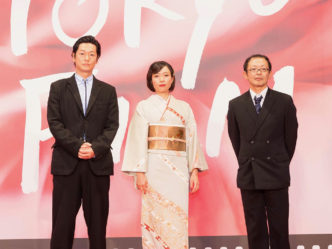
Waiting for the Moon team on the Red Carpet
二十六夜待ち
©Mance Thompson
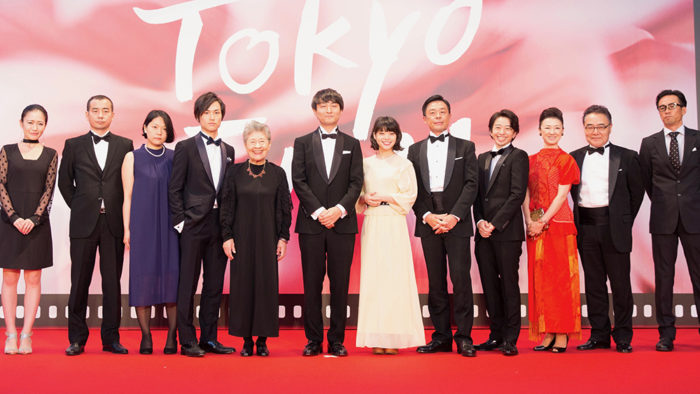
Goodbye, Grandpa! team on the Red Carpet
おじいちゃん、死んじゃったって。
©Mance Thompson
Ambiguous Places and Listen to Light were two titles that challenged filmmaking conventions but did not manage to utilize their own methods to the most successful ends. Perhaps the most controversial title in the Splash section, Ambiguous Places is the third feature by Akira Ikeda, director of the acclaimed Anatomy of a Paper Clip (2013). Despite Ikeda’s creation of a surreal and magical world, reminiscent of Roy Andersson’s work, the pretentiousness of the style fails to convince viewers of the significance of its own imagery, nor conveys anything deeper than a superficial farce.

Ambiguous Places, うろんなところ
Director: Akira Ikeda
©Akira Ikeda / Happy Tent
Kyoshi Sugita’s second feature, Listen to Light, consists of four omnibus stories, based on four different poems, about four female protagonists who hesitate to disclose their inner struggles. Refusing a conventional dramatic narrative, Sugita employs subtlety and restrained emotions in the film, which ends up seeming like an austere Eric Rohmer work, but with little of the maestro's philosophy or charm.

Listen to Light, ひかりの歌
Director: Kyoshi Sugita
Between Men and the Gods is the latest by Eiji Uchida, (Splash 2015’s Lowlife Love). A modern-day adaptation of Junichiro Tanizaki’s semi-autobiographical novel of the same name (one of three films being produced as part of the so-called Tanizaki Tribute), the drama concerns a trio trapped in a love triangle. It helps that one of the three is indie stalwart Kiyohiko Shibukawa, who gets most of the film’s laughs (and empathy) for his against-type portrayal of a country bumpkin doctor who remains devoted to the same woman for decades.
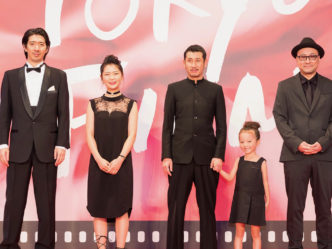
Between Men and the Gods team on the Red Carpet
神と人との間
©Mance Thompson
The Watanabe Brothers, winners of the Splash Prize in 2016 for Poolsideman, returned for the third year in a row with their latest, Party ‘Round the Globe, in which two Beatlemaniacs travel to a Paul McCartney concert. With its analogous overlaps with Poolsideman, this quasi-road movie depicts the banal daily routine of a silent protagonist in a similar manner to the previous feature. But this time, the brothers make a surprising turn that is as bright and pleasant as Poolsideman was dark, with looming hope amid society's disquiet.

Party 'Round the Globe, 地球はお祭り騒ぎ
Director: Hirobumi Watanabe
©FOOLISH PIGGIES FILMS
What stood out most in this year’s Splash program were the audacious approaches taken by several filmmakers to break the boundaries between fiction and reality. Takaomi Ogata’s The Hungry Lion starts off as a normal high-school drama about conflicts between female friends. One of them, seemingly the most popular, is rumored to be the star of a sex video that someone loaded online, and the male participant is their teacher. As the plot begins to deepen, Ogata’s one-scene one-cut realism approach successfully functions as a way to force spectators to emotionally disengage from the narrative and to ruminate on such social issues as fake news and social networking. Although its Brechtian effect ends up turning the protagonist into a simplistic victim of society, this fictional film delves into a frightening reality in the age of digital communications, conveying the universal concern that we don’t know what to believe any more.
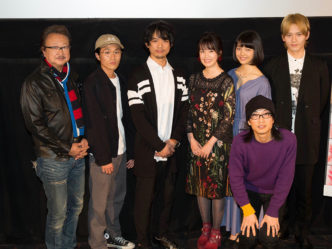
The Hungry Lion team at the Q&A
飢えたライオン
©Mance Thompson
On the other hand, Ice Cream and the Sound of Raindrops celebrates the power of fiction when reality is intolerable and dysfunctional. Following last year’s TIFF Competition entry Japanese Girls Never Die, Daigo Matsui directs this emotionally-charged drama about young actors and actresses who are determined to perform even when their stage production is unexpectedly shut down. The story is based on an actual incident, a production of Simon Stephens’ Morning that Matsui was going to direct, that was canceled in the middle of production. Impressively constructed with only a single, amazing shot over a 74-minute running time, the constantly moving camera and powerful performances reveal the pulsating power of artistic forces. Matsui adroitly transforms a regrettable reality into a magnificent piece of work that visually proclaims the vigor of youth and artistic creations that cannot be beaten down by any force in society.
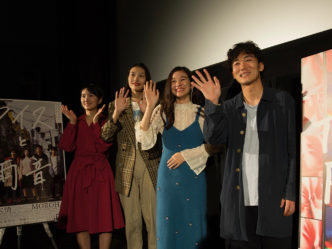
Ice Cream and the Sound of Raindrops team at the Q&A
アイスと雨音
©Mance Thompson
In the end, the Japanese Cinema Splash Best Picture Prize went to Of Love & Law, the section’s first-ever documentary entry, which delves into the reality of Japanese society’s intolerance for the marginalized. Hikaru Toda’s solo directorial debut is a compassionate record of the personal and professional struggles of a gay couple in Osaka, both lawyers who take on the cases that Japan does not really want to talk about — such as vulgarity in art and citizens deprived of citizenship. Instead of simply praising the couple for being a successful sexual minority, Toda’s interest lies in disclosing Japan’s systematic ignorance of, or indifference to, people on the margins of society, shedding a light on significant social issues through the eyes of the gay lawyers. At the same time, the film deconstructs the idea of family. Unveiling the charming and touching relationship between the couple and their “families,” Of Love & Law visually presents a new type of family values, if not biological or heterosexual, that can still be caring and supportive towards others. Growing up in Europe has apparently allowed Toda to see more deeply into Japanese society, and to create a rare film that holds up a powerful mirror to today's political reality.
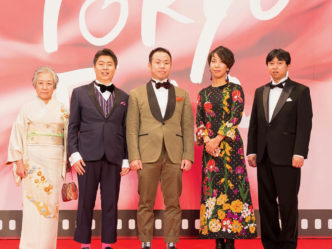
Of Love & Law team on the Red Carpet
©Mance Thompson
By Kenta Kato
— Kenta Kato is a Tokyo-based writer, film critic and festival programmer, currently working on a PhD degree in Film at Waseda University.
